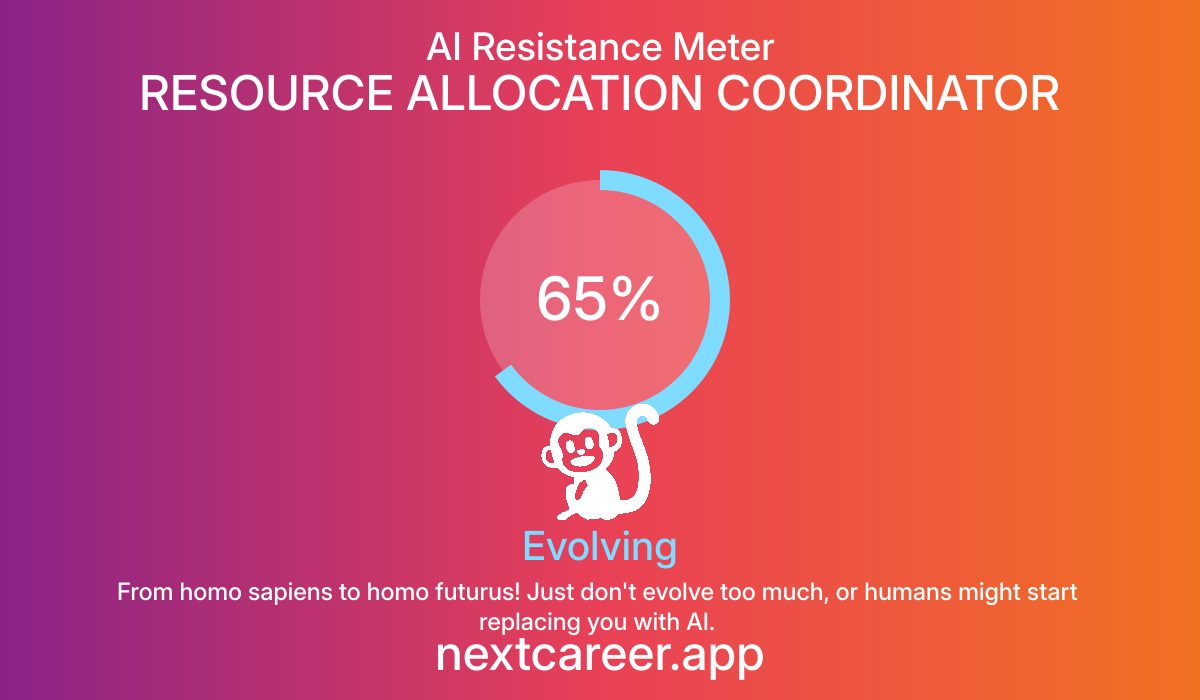AI Resistance Analysis
RESOURCE ALLOCATION COORDINATOR
RESOURCE ALLOCATION COORDINATOR
AI Resistance Score
AI Resistance Meter
Evolving
RESOURCE ALLOCATION COORDINATOR
You're upgrading faster than a computer from the 90s! Just remember, even flip phones thought they were the pinnacle of evolution once.
The role of a Resource Allocation Coordinator involves complex decision-making, ensuring the optimal distribution of resources in various projects while considering budget constraints and personnel management. While certain aspects of the job can be automated through AI, particularly in data analytics and reporting, the requirement for strategic oversight, interpersonal skills, and an understanding of nuanced contexts helps maintain its relevance in the near and far future.
The role of a Resource Allocation Coordinator involves complex decision-making, ensuring the optimal distribution of resources in various projects while considering budget constraints and personnel management. While certain aspects of the job can be automated through AI, particularly in data analytics and reporting, the requirement for strategic oversight, interpersonal skills, and an understanding of nuanced contexts helps maintain its relevance in the near and far future.
Key Factors
- Cognitive Tasks: High-volume data analysis tasks can be performed by AI with increasing efficiency, potentially reducing the need for human oversight in basic resource allocation.
- Emotional Intelligence: The necessity for empathy, negotiation, and relationship-building with teams and stakeholders creates a significant human advantage.
- Physical Skills: The job involves minimal physical tasks, making it less susceptible to automation in that regard.
- Creative Thinking: The role requires innovative solutions and strategic thinking, which AI currently struggles to replicate in complex, unpredictable environments.
Human Advantages
- High emotional intelligence is critical when managing teams and resolving conflicts.
- Strategic decision-making that accounts for complex variables in resource management is best suited to human intuition.
AI Vulnerabilities
- AI can automate routine data processing tasks, making them less dependent on human intervention.
- AI tools can generate insights that replace basic analytical tasks previously handled by coordinators.
Recommended Actions
- Develop advanced data analytics skills to work synergistically with AI tools.
- Enhance emotional intelligence through training to strengthen interpersonal relationships and conflict resolution skills.
- Focus on strategic planning capabilities that align with long-term organizational goals, moving away from purely operational tasks.
In the near term (5 years), AI will continue to improve in automating data-driven tasks, leading to a potential reassessment of the job's scope. Roles may shift towards more strategic involvement rather than day-to-day management. In the long term (20+ years), as AI capabilities evolve, Resource Allocation Coordinators may pivot to become more like resource strategy advisors, focusing on high-level planning and negotiations, leveraging AI for efficiency, rather than worrying about administrative tasks.

Why Calculate AI Resistance?
Understanding how AI-resistant your career is becoming increasingly important in today's rapidly evolving job market. Our analysis combines multiple factors including required human skills, technological adaptability, and future industry projections to give you a comprehensive view of your career's sustainability.